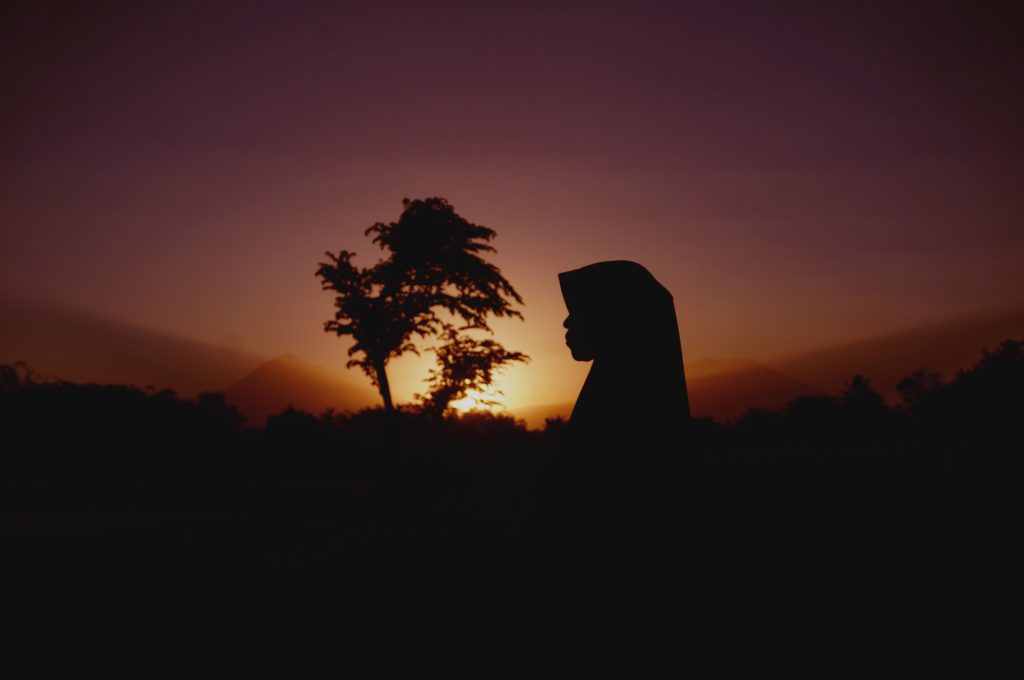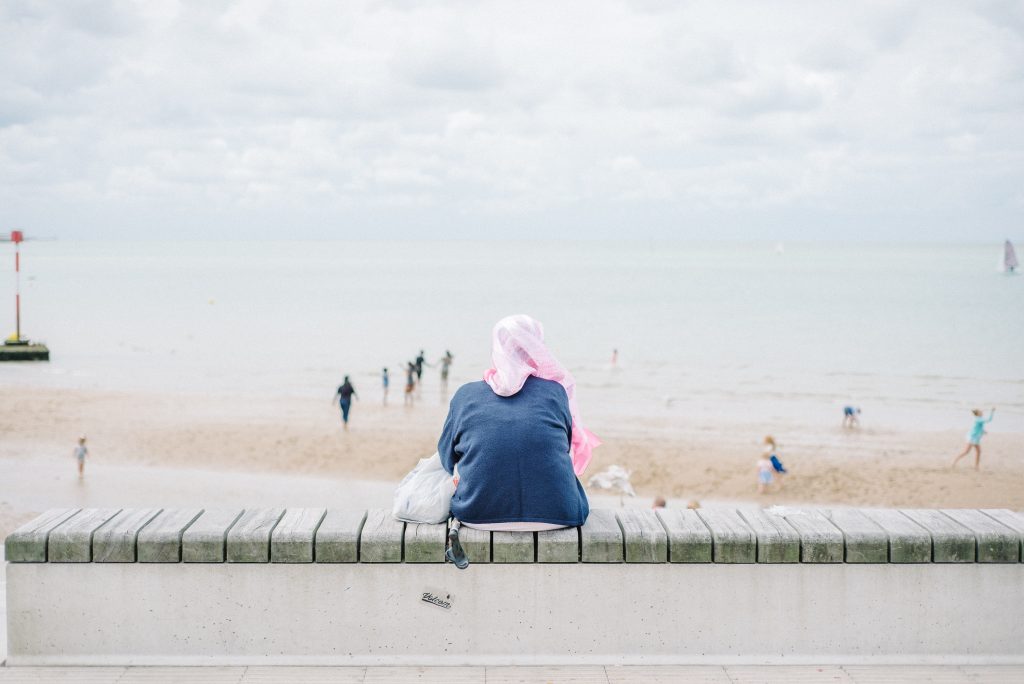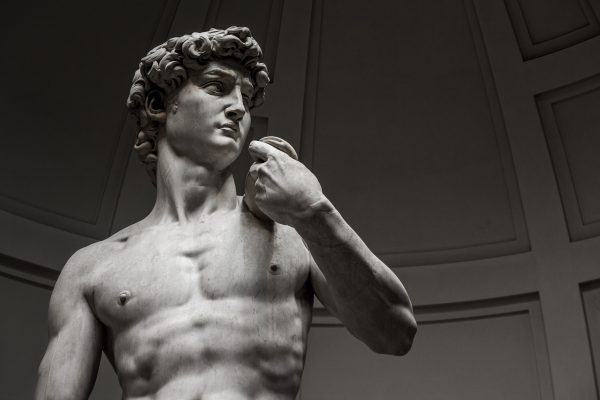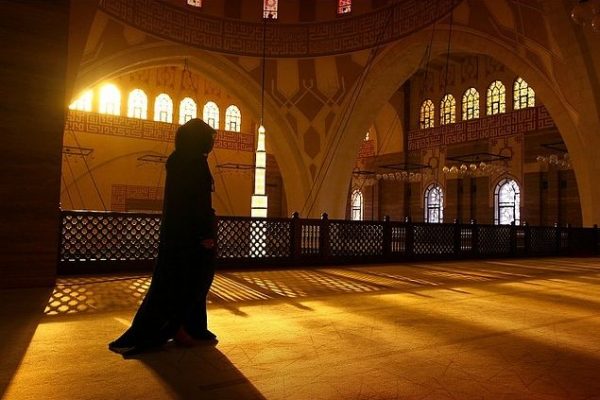“I think it’s about time I speak for myself, as a woman who observes the Muslim headscarf.”
“I think it’s about time I speak for myself, as a woman who observes the Muslim headscarf.”
For many years, I was loath to take part of the never-ending, overemphasized, and well-worn discussion on hijab, believing that when it comes to matters most important to our existence and purpose in this world, appearance scrapes the bottom of the list.
However, I’ve seen far too many people speak on my behalf about this matter, and though well-intentioned, portrayed me and my hijab in a false light. I think it’s about time I speak for myself, as a woman who observes the Muslim headscarf, insha’Allah.
It’s important to note that hijab, as I’m sure many of my readers know by now, is for both men and women, and isn’t limited to the head-covering. In the Quran, hijab is sometimes referred to in the metaphysical sense, and describes the barrier between mankind and God (42:51) or between obstinate hearts and guidance (41:5). It’s also used to describe literal curtains or partitions (19:17). The actual headscarf, or veil, is referred to as khimar in the Quran (24:31), but because the khimar is also a hijab, we tend to use the latter term. With the understanding that men have their own version of the veil, I wish to address the women’s version here specifically, because it is the easiest to identify and misconceive.
Hijab Does Not A Muslim Make
The veil doesn’t determine a woman’s faith – the woman makes the veil Islamic. The veil is merely an article of clothing that means little without the person it enwraps. One may cover their head yet not observe hijab. One may cover their head, follow Islam, yet not observe hijab.
The concept of hijab is multifaceted, and one side of it is modesty. Modesty is a state of mind; a virtue reached through the application of moral conduct. Modestly is not dependent on how you are perceived, but rather how you present yourself, regardless of who sees you. There’s a Hadith which recounts the time Lady Fatima Bint Muhammad gave alms to a blind man from behind a screen. When she was asked why she veiled herself in front of a blind man, she replied:
“He may not see me, but I can see him.”
Hijab Is Not Just About Averting the Male Gaze
Have you ever wondered why Muslim men and women observe hijab during salah? Even in the privacy of our own homes, we cover ourselves in front of our Creator, Who sees us in all states, and Who is worshipped in all states. In this act of ritual prayer, we cleanse ourselves through ablution, purify our surroundings, and dress appropriately. It may be safe to conclude, therefore, that hijab is also decency.

To dress decently is to be covered appropriately. Of course, that can be subjective, and that’s why we have Quran and Hadith to outline the basic requirements of covering with propriety. Respectability, like modesty, is dependent on behavior in addition to clothing. Islamic practices encourage good character and respectable appearance together. It is not enough, if one seeks to follow every aspect of Islamic principle, to be a good person. A Muslim should work on beautifying their surroundings as well as their spirit and emanate nobility inwardly and outwardly.
Hijab Does Not Protect Women
No garment can protect against predators unless it were made of iron. It is not a magical shield that drives away those with disease in their hearts, because people with ill-intentions are not deterred nor encouraged by clothing.
It does, however, garner respect from people with healthy minds. Men and women alike have looked upon the hijab with a sense of reverence, and feel, almost intuitively, the sacredness of the veil. In truth, is an outward display of inner taqwa (God-consciousness), and bears the mark of a submitter (Muslim) just as the bruise on the forehead, where the face meets the ground in prostration, does. A prostrator and muhajjaba (hijabi) have outward displays of submission, but not of belief. Evidences of faith are difficult to spot, and the veil is not one of them. The veil is evidence of submission to God; it is Islaam. Only God can determine a true believer. The most we can do is submit to His Word, and pray we be among the believers.
Why Wear Hijab?
I’m not addressing my Muslim sisters who choose not to cover their heads here – God knows they are far better Muslims than many I know, including myself. Even non-Muslims observe the hijab; as said earlier, it’s a virtue, not a garment. I write this to explain why I (and perhaps women like me) cover in this manner.
I’m aware that many interpret the Quranic verses pertaining to the head covering differently. That’s okay; the Book was written with some parts clear, and some parts open for interpretation. I just wonder, though, why it seems like some people (many of them men) are so keen to do away with this head-covering. Are they seeking to liberate Muslim women from these constraints? Do they struggle to understand why women are instructed to cover their heads while men do not? Does it seem unfair? But who gets to determine justice – us, in our fallible logic, or The Most Just?

Taking a stand against objectification and societal pressures while displaying our religion proudly despite prejudices is a benefit to wearing the headscarf, but not the reason. The real reason we wear it is, simply, because God said so. Some may scoff at adhering to a rule with unquestioning obedience, but the truth is, question it or not (and certainly, question it! Pick apart everything in our religion and put it back in the way that satisfies you!) the rule is there and there’s no way around it. There’s wisdom behind it, there’s goodness to be found in it, but in the end, we follow these guidelines solely to seek nearness to Him.
As someone who has worn the headscarf since I was nine years old alhamdulillah, I can tell you that it does not feel like daisies and rainbows. It’s a hassle, it’s uncomfortable, it feels far from empowering sometimes, and yes, I’m hot and itchy in it. It feels restrictive, especially for young women who want to be admired for their beauty, and don’t understand what’s wrong with displaying their God-given figure. It’s an obstruction to complete self-expression because it requires a certain level of reservation, and to be reserved is to hold back part of yourself that longs to be seen. For young girls who want to be understood and valued, noticed and admired, it’s so difficult to understand that.
Worse is the negative judgment they receive from all sides and the pressure to behave in a way most pleasing to what society demands of them. It’s exhausting trying to balance looking approachable and progressive to non-Muslims and conservative and religious to Muslims. There’s nothing they can do right, it seems, because each person has their own view of what a hijabi should act like.
To my sisters I say, don’t forget that this is not for people or society; this is for yourself. Nothing done for the sake of betterment is easy, and every virtue comes with a struggle against vice. It will all make sense, in due time insha’Allah.
The hijab is very much my choice, but I choose it because God ordained it, and His Word is Law.
My mother thought I was too young to wear the hijab at nine, but I persisted in asking till she acquiesced. She thought I was too young to wear the jilbab at fourteen, but I was tired of trying to layer five articles of clothing in order to be properly covered, only to end up failing nonetheless. Luckily nowadays fashion has taken a more Muslim-friendly turn, but it wasn’t like that before, and will not remain that way for long.
There is struggle, yes, but there is so much contentment as well. It becomes like a home, a place of familiarity. It becomes a source of comfort, like a meaningful pendant on a necklace, that reminds you of Who you were created for.
Just as He has put a veil between the Quran and the hardhearted (17:45), He has prescribed to the believers physical and behavioral veils to keep their sanctified image protected from evil. God Himself observes hijab, in many veils of light and darkness. The headscarf we wear is symbolic of His hidden beauty, that reveals itself only to a select few.
If God covers His Beauty with hijab, I certainly can cover mine.





